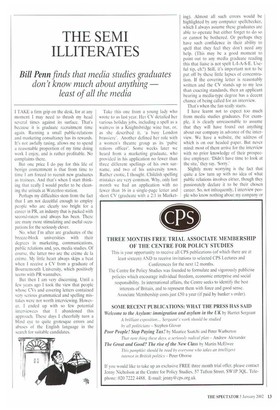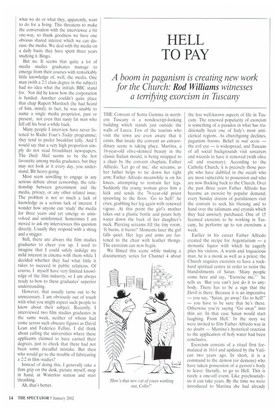THE SEMI ILLITERATES
Bill Penn finds that media studies graduates
don't know much about anything least of all the media
I TAKE a firm grip on the desk, for at any moment I may need to thrash my head several times against its surface. That's because it is graduate recruitment time again. Running a small public-relations and marketing consultancy has its rewards. It's not awfully taxing, allows me to spend a reasonable proportion of my time doing work I enjoy, and is rather profitable. No complaints there.
But one price I do pay for this life of benign contentment is that from time to time I am forced to recruit new graduates as trainees. And that's when I start thinking that really I would prefer to be cleaning the urinals at Waterloo station.
Perhaps my difficulties stem from the fact that I am not deceitful enough to employ people who are clearly too bright for a career in PR, an industry that is packed with second-raters and always has been. There are many more stimulating and useful occupations for the seriously clever.
No. what I'm after are graduates of the breeze-block universities with their degrees in marketing, communications, public relations and, yes, media studies. Of course, the latter two are the creme de la creme. My little heart always skips a beat when I receive a CV from a graduate of Bournemouth University, which positively teems with PR wannabes.
But then I am very discerning. Until a few years ago I took the view that people whose CVs and covering letters contained very serious grammatical and spelling mistakes were not worth interviewing. However, I ended up with so few potential interviewees that I abandoned this approach. These days I cheerfully turn a blind eye to quite grotesque errors and abuses of the English language in the search for suitable candidates. Take this one from a young lady who wrote to us last year. Her CV detailed her various holiday jobs, including a spell as a waitress in a Knightsbridge wine bar, or, as she described it, 'a busy London brassiere'. Another defined her role with a women's theatre group as its 'pubic rations officer'. Some weeks later we heard from a marketing graduate, who provided in his application no fewer than three different spellings of his own surname, and two of his university town. Rather exotic, I thought. Childish spelling mistakes are very common. Why. only last month we had an application with no fewer than 16 in a single-page letter and short CV (graduate with a 2:1 in Market ing). Almost all such errors would be highlighted by any computer spellchecker, which I always assume these graduates are able to operate but either forget to do so or cannot be bothered. Or perhaps they have such confidence in their ability to spell that they feel they don't need any help. (This may be a good moment to point out to any media graduate reading this that liaise is not spelt L-I-A-S-E. Useful tip, eh?) Still, it's important not to be put off by these little lapses of concentration. If the covering letter is reasonably written and the CV stands up to my less than exacting standards, then an applicant bearing a media-type degree has a decent chance of being called for an interview.
That's when the fun really starts.
I have learnt not to expect too much from media studies graduates. For example, it is clearly unreasonable to assume that they will have found out anything about our company in advance of the interview. We have a website, the address of which is on our headed paper. But never mind: most of them arrive for the interview with no prior knowledge of their prospective employer. 'Didn't have time to look at the site,' they say. 'Sorry.'
Slightly more worrying is the fact that quite a few turn up with no idea of what public relations involves either, though they passionately declare it to be their chosen career. So, not infrequently, I interview people who know nothing about my company or what we do or what they, apparently, want to do for a living. This threatens to make the conversation with the interviewee a bit one-way, so thank goodness we have one obvious shared interest which we can discuss: the media. We deal with the media on a daily basis; they have spent three years studying it. Bingo.
But no. It seems that quite a lot of media studies graduates manage to emerge from their courses with remarkably little knowledge of, well, the media. One man (with a 2:1 class degree in the subject) had no idea what the initials BBC stand for. Nor did he know how the corporation is funded. Another couldn't quite place that chap Rupert Murdoch (he had heard of him, mind); in fact, he was unable to name a single media proprietor, past or present, not even that nasty fat man who fell off his boat a while back.
Many people I interview have never listened to Radio Four's Today programme; they tend to prefer breakfast telly. And I would say that a very high proportion simply do not read broadsheet newspapers. The Daily Mail seems to be the hot favourite among media graduates, but they may not look at it every day, you understand. Bit heavy-going.
Most seem unwilling to engage in any serious debate about censorship, the relationship between government and the media. privacy, or any other related issue. The problem is not so much a lack of knowledge as a serious lack of interest. I wonder how anyone can 'study' the media for three years and yet emerge so uninvolved and uninformed. Sometimes I am moved to ask my interviewees this question directly. Usually they respond with a shrug and a snigger.
Still, there are always the film studies graduates to cheer you up. I used to imagine that I could safely indulge my mild interest in cinema with them while I decided whether they had what little it takes to succeed in public relations. Of course, I myself have very limited knowledge of the film industry. so I am always ready to bow to these graduates' superior understanding.
However, that usually turns out to be unnecessary. I am obviously out of touch with what you might expect such people to know about their subject. Recently, I interviewed two film studies graduates in the same week, neither of whom had come across such obscure figures as David Lean and Federico Fellini. I did think about calling the universities where these applicants claimed to have earned their degrees, just to check that there had not been some dreadful mistake. But then who would go to the trouble of fabricating a 2:2 in film studies?
Instead of doing this, I generally take a firm grip on the desk, picture myself, mop in hand, at Waterloo station and start thrashing.
Ah, that's better.























































 Previous page
Previous page